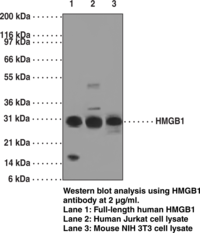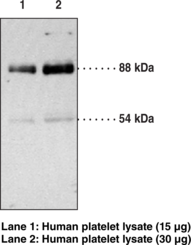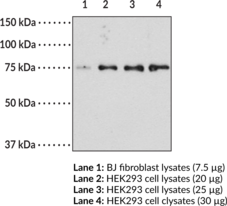Description
High Mobility Group Protein B1 (HMGB1) belongs to the HMGB family and contains two HMG box DNA-binding domains. It is a highly conserved, ubiquitous protein present in the nuclei and cytoplasm of nearly all cell types, and is a necessary and sufficient mediator of inflammation during sterile and infection-associated responses. HMGB1 also act as DNA nuclear binding protein that has recently been shown to be an early trigger of sterile inflammation in animal models of trauma-hemorrhage via the activation of the Toll-like receptor 4 (TLR4) and the receptor for the advanced glycation endproducts (RAGE).{20300} It is reported that the level of HMGB1 is elevated during sterile tissue injury, infection, lethal endotoxemia or sepsis, collagen-induced arthritis, and ischemia-reperfusion induced tissue injury.{20304}
Synonyms: High Mobility Group Protein B1|HMG1
Immunogen: full length recombinant human HMGB1
Formulation: 100 µg of Protein G purified IgG2bk in 200 µl PBS containing 0.05% BSA and 0.05% sodium azide
Isotype: IgG2bκ
Applications: FC, IHC (paraffin-embedded tissue), and WB
Origin:
Stability: 365 days
Product Type|Antibodies|Monoclonal Antibodies||Research Area|Immunology & Inflammation|Autoimmunity|Rheumatoid Arthritis||Research Area|Immunology & Inflammation|Innate Immunity|Pattern Recognition||Research Area|Immunology & Inflammation|Innate Immunity|Sepsis/Shock||Research Area|Infectious Disease



